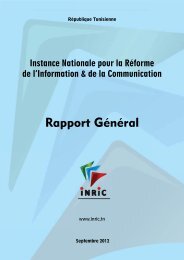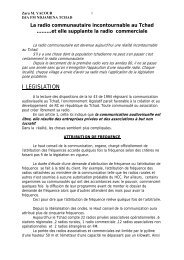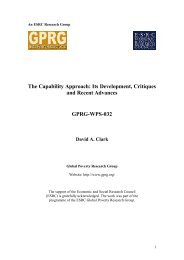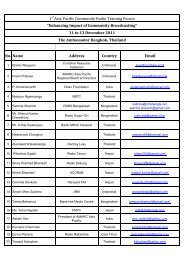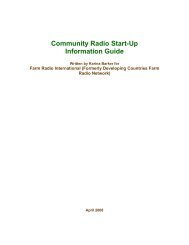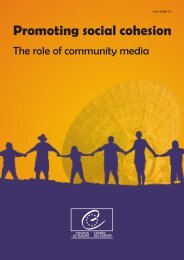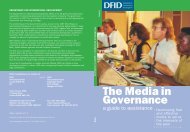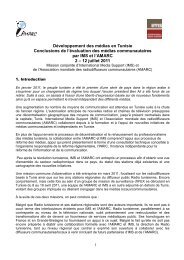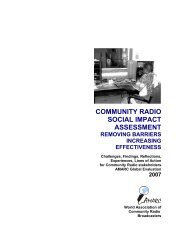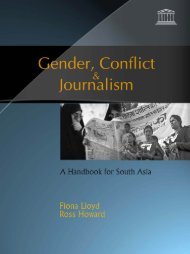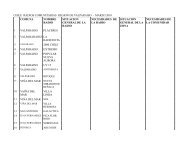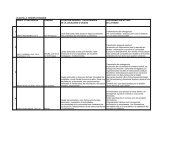Women's Empowerment and Good Governance Through - amarc
Women's Empowerment and Good Governance Through - amarc
Women's Empowerment and Good Governance Through - amarc
Create successful ePaper yourself
Turn your PDF publications into a flip-book with our unique Google optimized e-Paper software.
39<br />
Best Experiences for an Action Research Process<br />
Africa (PIWA), with the Institute for Media <strong>and</strong> Society (IMS), launched an advocacy program,<br />
the Initiative on Building Community Radio in Nigeria.<br />
In 2005 <strong>and</strong> 2006, the initiative took the advocacy to higher levels. A national conference<br />
capped the zonal workshops <strong>and</strong> generated outputs such as a corporate structure for community<br />
radio stakeholders <strong>and</strong> a new Plan of Action. This was followed by a series of sectoral<br />
engagements that featured international development bodies <strong>and</strong> local groups such as the<br />
World Bank <strong>and</strong> the Nigerian media. An AMARC regional seminar twinned with a Nigerian CR<br />
Policy Dialogue in Abuja also took centre stage.<br />
With the message of CR development going down to the grassroots through the nationwide<br />
awareness-raising, the engagement of government agencies was also being pursued. Before<br />
long, the government began to respond to stakeholders’ dem<strong>and</strong>s. From 2004 to 2006, it instituted<br />
at least three policy development/reform processes: a review of the National Mass Communication<br />
Policy, the Development of a National Frequency Spectrum Management Policy<br />
<strong>and</strong> a National Community Radio Policy.<br />
The CR initiative engaged these processes by developing <strong>and</strong> submitting comprehensive<br />
memor<strong>and</strong>a into them. The release of the final documents by the government is being awaited.<br />
Community radio <strong>and</strong> democratization/governance<br />
Nigeria returned to civil rule in 1999 after more than 15 years of military dictatorship. Over the<br />
past eight years, the public space has relatively become freer, <strong>and</strong> basic freedoms, including<br />
freedom of expression <strong>and</strong> the media, have improved while democratic institutions are<br />
developing.<br />
But challenges remain. There is still a substantial deficit in the development <strong>and</strong> provision of<br />
social infrastructure, much of which went into decay during the years of the military. Transparency<br />
<strong>and</strong> accountability have not become deeply embraced cultures in governance institutions.<br />
The electoral system has not made any appreciable advance. And the grassroots, where<br />
the majority of the population lives, have not benefited from democracy.



